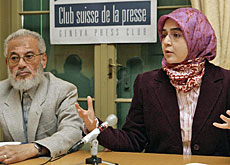Expert says no need for Swiss to fear Muslims

Switzerland should avoid prejudice towards its Muslim community to avoid the mistakes of other states, renowned Middle East expert Arnold Hottinger tells swissinfo.
The veteran journalist dismissed recent “relatively harmless” attempts by the rightwing Swiss People’s Party to ban minarets in Zurich, but warned against stereotyping Muslims as aggressors.
Hottinger believes the recent assassination of Lebanese industry minister Pierre Gemayel was perpetrated by disaffected former secret service agents rather than by Syria. And he doubts there will be a military conflict between Iran and the United States in the immediate future.
The 80-year-old Swiss was in Zurich on Friday attending an international forum on West-East relations at the city’s university.
swissinfo: Has the historic misunderstanding between Muslim and Western cultures taken a turn for the worse recently?
Arnold Hottinger: The situation has become more complex in recent years. The clash used to have a straightforward nationalistic dimension, such as France versus Egypt. That was certainly violent, but it was relatively simple.
But the politicisation of Islam has brought a second dimension that is much more complicated. Now we have a secularised Western society confronting cultural and political problems with Islam with no meaningful interface between the two sides.
This is partly an illusion because the antagonism over the Palestinian Territories is essentially an old fashioned territorial dispute and Iraq is all about who gets the petrol. But President George Bush has turned it [Iraq] into a crusade.
swissinfo: But this mistrust has now permeated to the man on the street.
A.H.: The man on the street has been fed a false idea about a clash of civilisations that is believed by many people. Globalisation and migration has moved this “clash” into Europe.
It is the fault of westerners that they want to see all Muslims as being against us, which has created a Muslim stereotype. If you talk badly about all Muslims they will talk badly back and if you bomb all Muslims they will bomb you back.
swissinfo: The People’s Party recently attempted to ban new minaret construction in Zurich. Could such ideas eventually cause the same problems as we have seen in France where some sections of the Muslim immigrant population rioted this year?
A.H.: Whenever you have immigration from another country it naturally creates fear that you are being penetrated by a foreign entity. Some people try to make political gains out of this fear, but the examples in Switzerland are relatively harmless.
I don’t think Switzerland will experience the same troubles as in Paris or London because we don’t have large ghettos of immigrants here. This is something Switzerland should avoid.
swissinfo: What can be done to prevent misunderstanding in future?
A.H.: A large part of the blame lies with the media and journalists must change the way they approach the subject. Instead of pointing out who is radical, people must ask why and try to understand the reasons behind this.
The answer to this question is that the more hopeless people feel the more likely they are to turn to radical solutions.
swissinfo: Turning to Lebanon, what do you make of the recent assassination of government minister Pierre Gemayel?
A.H.: Lebanon has been through the terrible experience of a civil war and they are now hovering on the brink of chaos.
I don’t think this assassination was a Syrian conspiracy but was probably the work of former Lebanese secret service agents who want to see a return to the old rule. They think they can achieve this by causing chaos.
swissinfo: How great is the danger of a military conflict between Iran and the West?
A.H.: The US has not discarded the possibility of a war with Iran. Bush’s instinct is to beat them up, but he has nothing to beat them with because his soldiers are in Iraq. This makes military action in Iran unlikely in the short term.
swissinfo-interview: Matthew Allen
There are about 340,000 Muslims in Switzerland, coming mainly from the Balkans and Turkey.
They represented 2.2% of the population in 1990 and 4.3% in 2000.
One of the main reasons for the rise is the arrival of refugees from the former Yugoslavia.
The People’s Party launched an initiative in the Zurich cantonal parliament in August to ban the construction of minarets – towers built on top of mosques – in the canton.
Arnold Hottinger was a correspondent specialising in Middle East issues for a number of media organisations, including Swiss newspaper the Neue Zürcher Zeitung and public radio DRS.
He continues to write books and articles for the media. Hottinger is also a member of the Swiss Society for Middle East and Islamic Culture.
The Zurich University forum, entitled “1001 News Items – East-West Images, Understanding and Misunderstanding in the Media and Politics”, runs until November 25.
Its purpose was to explore and understand misconceptions between eastern and western cultures.

In compliance with the JTI standards
More: SWI swissinfo.ch certified by the Journalism Trust Initiative












You can find an overview of ongoing debates with our journalists here . Please join us!
If you want to start a conversation about a topic raised in this article or want to report factual errors, email us at english@swissinfo.ch.